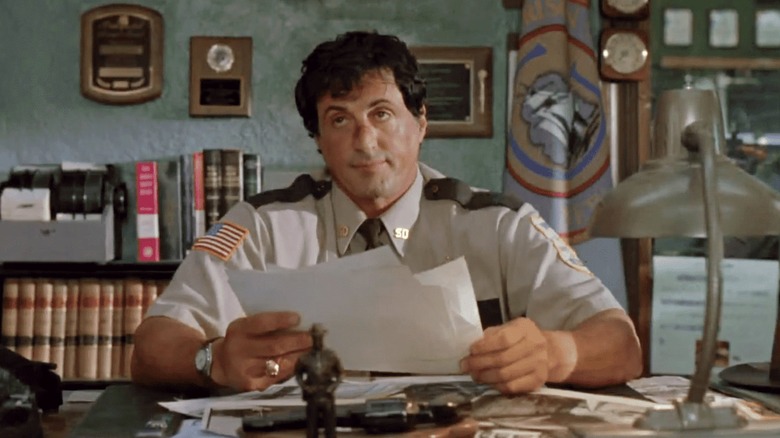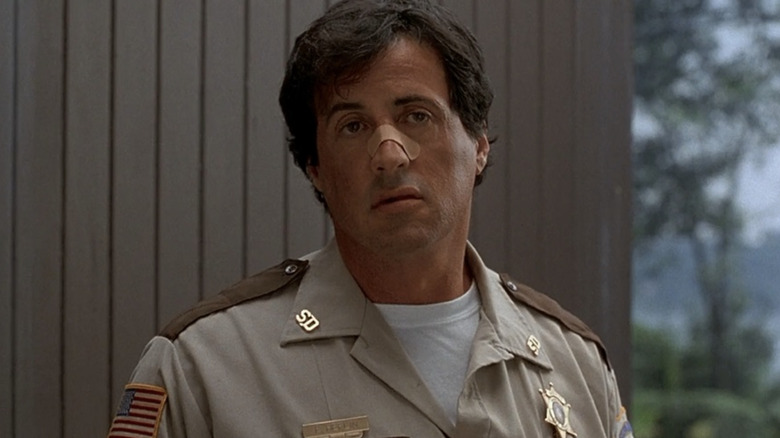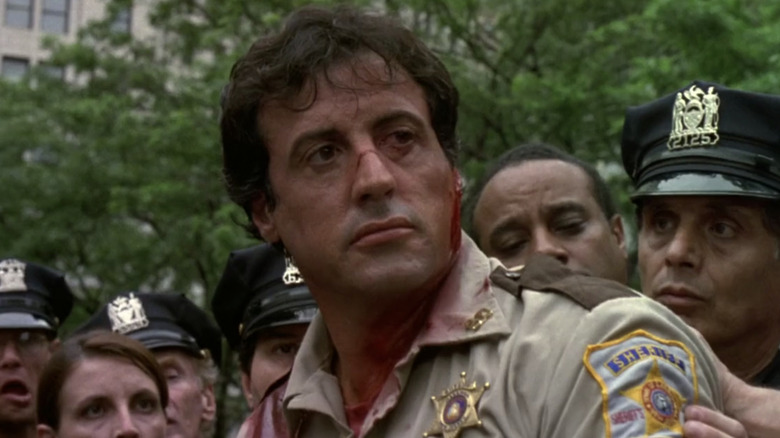James Mangold Wanted Cop Land To Be A Mashup Of Westerns And Sidney Lumet
James Mangold's sophomore feature film "Cop Land" has interesting intersections of genre and tone that, in hindsight, are telling of the director's future projects. Starring big-name talent like Sylvester Stallone, Robert De Niro, and Harvey Keitel, the film tells the story of a sheriff in a small New Jersey town who comes into conflict with a group of corrupt New York police officers who live in the community. "Cop Land" is a slow burn that thrives off the incredible performances of its actors, mainly Stallone. Equal parts social commentary and suspenseful thriller, "Cop Land" is a successful ensemble that had plenty of influences to its story, according to director James Mangold.
Even looking past "Cop Land," Mangold has been transparent in his inspirations when making movies. One of the most recent examples is 2017's "Logan," a film whose title and themes of violence pull directly from the 1953 Western "Shane." Just as "Logan" pulled from road movies and Westerns of all kinds, "Cop Land" remains a powerful entry in the director's filmography because of its neo-Western landscape, along with Mangold's admiration for director Sidney Lumet. The script ended up being a mashup of the director's two interests, with a story that's surprisingly timeless.
I had this idea of a town...
In a 2020 retrospective piece, James Mangold spoke to Vulture about how he conceived the idea for a film like "Cop Land." Although it was released in 1997, the film is eerily reminiscent of the current political climate and the societal woes brought on by the reckless actions of police officers. The idea to exemplify the feelings of unease brought on by police establishments' close-knit circles came to Mangold on a drive:
"I remember getting the idea for the movie while driving on the Palisades Parkway, and thinking about how to transpose a Western movie template onto what you might call a 1970s Sidney Lumet film — to make a film about these communities that were all interconnected, yet at war. I had this idea of a town that would exist and be similar to the town I grew up in — only exaggerated to be 100 percent cops."
Famous Sidney Lumet movies like the 1957 classic "12 Angry Men" or "Dog Day Afternoon" are intense, character-driven films with a sharp social lens. Given Mangold's ambition to combine the tone of a Lumet film with a "Western movie template," it's no wonder that "Cop Land" became such a provocative film that has aged so well. In regard to the crucial other half of that mashup, the small town setting is the critical aspect that plays most into the Western genre.
'Oversimplifications yield interesting analogies'
James Mangold cleverly builds the themes of the film around the locale, as the small New Jersey town in "Cop Land" serves as both a poignant backdrop to tell its story of corruption, while also reinforcing the small town neo-Western aesthetic. The town serves as a border for the cops who separate their New York occupations from their lawless lives in the suburbs. The antagonists of the story are overtly corrupt, and Mangold feels that providing a stripped down view of the characters can lead to interesting modes of interpretation, as well as current-day parallels (intentional or not):
"In many ways, obviously, it becomes a gross oversimplification, but sometimes oversimplifications can yield interesting analogies. To whatever degree 'Cop Land' has relevance now, it was about a world in which everyone is so tribalized and traumatized — everyone fighting for their piece of green valley — that no one has the emotional space to exist. Morality becomes a luxury."
Mangold paints a beautiful and tragic picture with this description of "Cop Land." This small movie about a community of cops builds its tension much like a Sidney Lumet film, and uses its backdrop to reinforce the neo-Western tone of the movie. At the same time, its methodical pace builds to a well-earned shootout thanks to the fantastic character work. Mangold's 1997 mashup of influences created a gritty film that is all the best parts of what inspired it.


